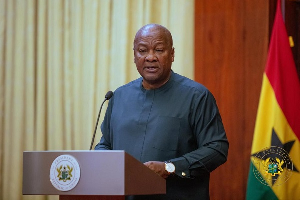Tamale, Nov. 17, GNA - The desired impact on the poor was yet to be achieved as the poverty situation seems not to be getting any better in the districts in the Northern Region, ActionAid Ghana's research findings on pro-poor budgeting has revealed.
This situation has been attributed to the lack of transparency, accountability and probity, as well as inadequate participation of the poor in decision-making on resource allocations, resulting in the dismal performance of pro-poor policies and programmes at the district levels. Inefficient budgeting, budget expenditure tracking and reporting were attributable to the just modest achievement realised so far in poverty reduction in these districts in particular and the country as a whole. These were contained in a 31-paged booklet presented at a two-day validation/dissemination workshop to study Pro-poor budgeting of district assemblies in Tamale on Wednesday.
The forum would discuss the Northern Region West Development Programme of Action Aid Ghana, research report on "Efficient Budget Tracking and Reporting for the Promotion of Pro-Poor Budgeting at the District Level", which was carried out in the Tamale Metropolitan and the East Gonja District in May 2005.
The research findings was meant to establish an optimal means of improving the budgeting and reporting systems of the district assemblies to ensure transparency, accountability and pro-poor budget preparation and reporting.
District Chief Executives, Presiding Members, Planning and Budget Officers and members of civil society Organisations attended the forum.
The report identified inefficient budget tracking and reporting as well as the anti-pro-poor nature of most district budgets, as a factor that had led to persistent impediment of progress of the district assemblies in their development efforts but that seems to have eluded the attention by both policy makers and implementers.
"Peoples views should be fed into the budget making process. It is common a knowledge that the participation of the poor, vulnerable and the disadvantaged in the budgeting and budget expenditure tracking of poverty reduction projects had been relegated to the background by the assemblies", the report noted.
"The poor are the true poverty experts yet pro-poor budgetary allocation of the District Assemblies Common Fund (DACF) and Internally Generated Fund (IGF) of the studied districts are done without their involvement. This problem is compounded with inadequacies in their reporting systems", the report added.
According to the report, the Local Government Act 1993, which specifies that district development plans and budgets should be effectively implemented alongside each other, had been violated with impunity.
It observed that a lot of activities outside the budget were carried out in favour of the better-endowed areas of the districts, which were not included in the budget, thereby putting stresses on the already scanty financial resources of these assemblies.
The participation of the poor in projects and activities aimed to improve their living conditions and livelihoods, the reported suggested would engender trust and accountability, as well as the feeling of ownership, thereby leading to sustainable poverty reduction and local development.
The report said poverty reduction programmes that increase the confidence; competence and participation of poor in decision-making could substantially increase their social and economic performance and fortunes, especially their ability to utilize grants and credits effectively.
The report suggested that to improve the budgeting process and promote the pro-poor budgeting and planning in the districts, auditing of assembly accounts should take into consideration, whether projects financed from DACF and other funds were contained in the Medium-Term Development Plan and Annual Action Plan.
It called for appropriate sanctions against district officials, who violate the Local Government Act, while advocacy groups and the Regional Coordinating Council (RCC) should ensure that all planning activities including budgeting was participatory and in favour of the poor. The search also called for the development of a quota system by the district assemblies to ensure that all segments of the society benefited from the resources allocated to the assemblies.
Any District Chief Executive, who unduly influences budgets to the neglect of sections of the districts because of political persuasion should be sanctioned, while efforts were made to redefine the Member of Parliament (MP) share of the DACF to forestall the haphazard manner in which it was being utilized by MPs.
General News of Thursday, 17 November 2005
Source: GNA
















